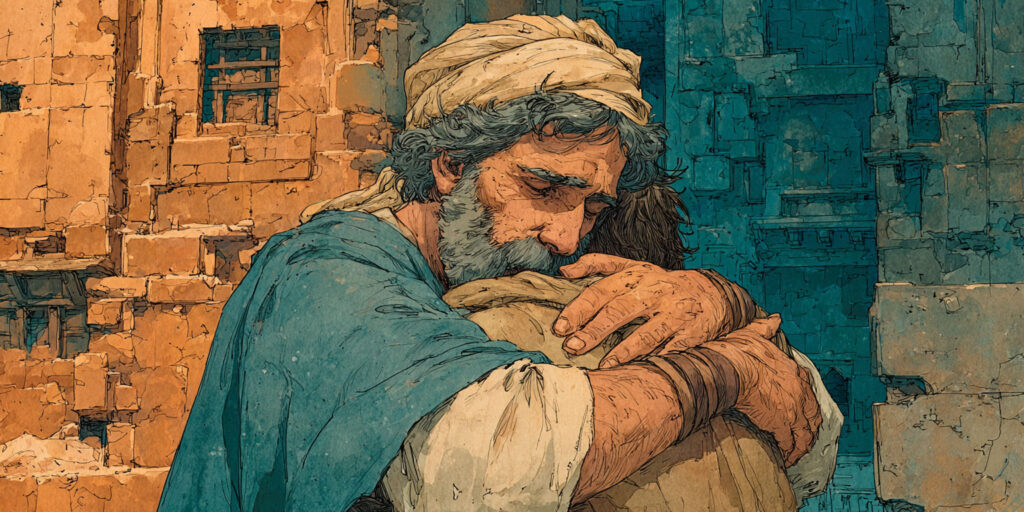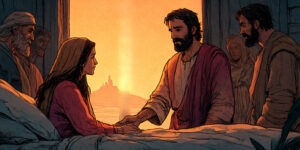
Peace
The gospel claims something bold: God offers real peace. Peace with Him, peace inside yourself, and peace with other people. But that peace isn’t automatic…

And he said, “There was a man who had two sons. And the younger of them said to his father, ‘Father, give me the share of property that is coming to me.’ And he divided his property between them. Not many days later, the younger son gathered all he had and took a journey into a far country, and there he squandered his property in reckless living. And when he had spent everything, a severe famine arose in that country, and he began to be in need. So he went and hired himself out to one of the citizens of that country, who sent him into his fields to feed pigs. And he was longing to be fed with the pods that the pigs ate, and no one gave him anything.
“But when he came to himself, he said, ‘How many of my father’s hired servants have more than enough bread, but I perish here with hunger! I will arise and go to my father, and I will say to him, “Father, I have sinned against heaven and before you. I am no longer worthy to be called your son. Treat me as one of your hired servants.”’Luke 15:11-19
In one of the most beloved passages of Scripture—often known as the Parable of the Prodigal Son—Jesus delivers a story that holds profound truths about our relationship with God, the nature of repentance, and the character of our Heavenly Father. Though it’s a parable with just three main characters, each of them is essential to understanding what Jesus came to reveal: that He came to seek and save the lost.
The younger son’s story is familiar: brash and arrogant, he demanded his inheritance early—a declaration that he’d rather have his father’s money than his presence. He believed that life beyond home held better treasures, free from his father’s rules. He was wrong.
Soon, his resources—and his friendships—ran dry. His companions had only been with him as long as the drinks were flowing. In desperation, he found work feeding pigs—a humiliating job for a Jewish man of his time. In that rock-bottom moment, he realized something essential: he had been wrong. He came to himself. He remembered his father’s house, not just the comforts, but the goodness and love that dwelled there. This epiphany turned him around.
What he didn’t expect—what many of us still struggle to accept—is the overwhelming grace of the father. The young man rehearsed a speech, hoping just to be hired as a servant. But his father wasn’t waiting with conditions. He was waiting with open arms.
The father ran to meet him. Before the son could finish his speech, the father restored him with a robe, a ring, and sandals—symbols of family, authority, and dignity. He celebrated with a feast. This wasn’t about justice. It was about love.
The story is clear: God’s love surpasses our imagination. No matter what you’ve done, no matter how far you’ve gone, the Father wants you back—not as a slave, but as His beloved child.
But not everyone was happy. The older brother—faithful, obedient, and hardworking—couldn’t understand the celebration. In his heart, he believed he had earned the father’s love through performance. He saw his brother’s return as unjust.
This too speaks to us. Like the Pharisees of Jesus’ day, we can miss the heart of God when we focus more on rules than on relationship. The older son was physically close to the father, but emotionally distant. His bitterness kept him from rejoicing in redemption.
Ultimately, this parable isn’t just about a family—it’s about perspective. It’s about seeing the world, and especially people, through the eyes of the Father. Whether we’ve wandered far like the younger son, or tried to prove ourselves like the older one, what matters most is coming home. Not just physically, but spiritually—into the arms of grace.
The story also reminds us of the critical role fathers play in our lives. Whether your earthly father was a source of strength or of pain, the parable points us to the one perfect Father—God Himself—whose love never fails.
Parents, particularly fathers, have the high calling to love their children in a way that reflects God’s character: with patience, sacrifice, and wisdom. And even when we fall short, God’s grace can fill the gaps.
We all, at times, take our families for granted. We all drift, get lost in ourselves, or get stuck in judgment. But God’s invitation stands: come home. Don’t waste time rehearsing speeches. Don’t let guilt hold you back. Just come. God is not a distant judge with a checklist—He is a running Father with arms wide open.
So whether you are the prodigal, the older brother, or someone simply seeking direction, remember this: God’s love is deeper than your sin, His grace is wider than your past, and His home is always open.

The gospel claims something bold: God offers real peace. Peace with Him, peace inside yourself, and peace with other people. But that peace isn’t automatic…

Advent starts by asking us to slow down and look past the distractions. Every culture wraps Christmas in its own extras—traditions, shopping, decorations, sentimental ideas.

After Paul left Galatia, other teachers came. They questioned Paul’s authority and offered the Galatians a far more “comfortable” message…

Jesus leaves the synagogue in Capernaum and steps into a home. Simon Peter’s mother-in-law lies with a high fever.